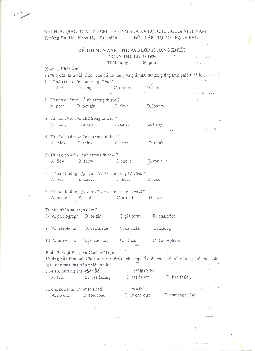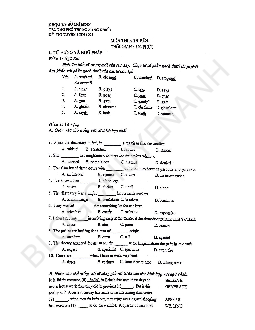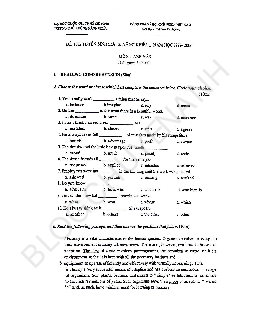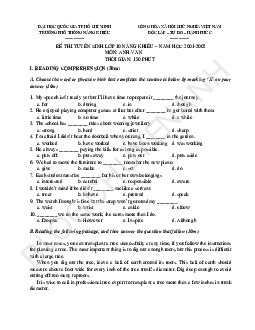





Preview text:
ĐỀ ĐĂK LĂK A.
Read the following passage and mark the letter A, B, C, or D on your answer sheet to indicate
the correct word or phrase that best fits each of the numbered blanks. TEENAGE TEACHERS
People may think teenagers are too young to be in charge of a class when they’re still students
themselves, but that’s not true. Sixteen- year- olds are (1)
teaching lessons to primary school
children in a new government scheme which allows school leavers to work as teaching assistants in primary schools.
They recently introduced new rules (2)
have allowed all primary school teachers to have more
time during the school day for preparing lessons, but this sometimes means that teachers have less time for
teaching. Now teenagers fill the gap. They take (3)
two- year course, starting when they’re 14.
When they enter the lesson as teachers rather than students, they (4) _
to quickly put into practice the
skills they learned while they were studying.
The government believes that about 18,000 teenagers could get jobs in this way. However, many people
believe that young teenagers will not make suitable teachers.
Question 1. A. currently B. newly C. recently D. previously
● Currently (adv) /ˈkʌrəntli/: hiện tại
● Newly (adv)/ˈnjuːli/: mới
● Recently (adv)/ˈriːsntli/: gần đây
● Previously (adv)/ˈpriːviəsli/: trước đây Question 2. A. who B. which C. whom D. whose
● Đại từ quan hệ “which” thay thế cho “new rules” Question 3. A. an B. a C. the D. many
● ‘An’ đứng trước nguyên âm (u,e,o,a,i) ▪
‘A’ đứng trước phụ âm
● Danh từ ghép: (a/an) + số - N + N (số ít) ▪
Ví dụ: a 10-minute break: nghỉ 10 phút
● a 10-day vacation: một kỳ nghỉ 10 ngày
● Many + với danh từ đếm được số nhiều, có nghĩa là “nhiều” Question 4. A. may B. can C. have D. will ● May + V0: có lẽ ● Can + V0: có thể ● Have to V0: phải ● Will + V0: sẽ B.
Mark the letter A, B, C or D on your answer sheet to indicate the word that differs from the
other three in the position of primary stress in each of the following questions.
Question 5. A. prepare B. practice C. prevent D. provide A. /prɪˈper/ B. /ˈpræktɪs/ C. /prɪˈvent/ D. /prəˈvaɪd/ Question 6. A. favorite B. beautiful C. popular D. Effective A. /ˈfeɪvərɪt/ B. /ˈbjuːtɪfl/ C. /ˈpɒpjələ(r)/ D. /ɪˈfektɪv/ C.
Mark the letter A, B, C or D on your answer sheet to indicate the sentence that has the same
meaning as the sentence printed before it.
Question 7. The student next to me kept chewing gum. That bothered me a lot.
A. The student next to me kept chewing gum bothered me a lot.
B. The student next to me kept chewing gum, that bothered me a lot.
C. The student next to me kept chewing gum which bothered me a lot.
D. The student next to me kept chewing gum bothering me a lot.
● Mệnh đề quan hệ: ‘which’ Làm chủ ngữ hoặc tân ngữ, thay thế cho danh từ chỉ vật “which” thay thế cho “chewing gum”
Question 8. My dad has a wide range of practical life skills. He can solve most problems by himself.
A. If my dad had a wide range of practical life skills, he could solve most problems by himself.
B. Were my dad to have a wide range of practical life skills, he couldn’t solve most problems by himself.
C. Because of having a wide range of practical life skills, my dad cannot solve most problems by himself.
D. Without a wide range of practical life skills, my dad couldn’t solve most problems by himself.
● Câu điều kiện loại 2: Without + N, S + would V: Nếu không vì …. Thì…. D.
Mark the letter A, B, C or D on your answer sheet to indicate the word(s) CLOSEST in
meaning to the underlined word(s) in the following question.
Question 9. She should pat herself on the back for having achieved such a high score in the final examination.
A. check up her back: kiểm tra lưng
B. praise herself: ca ngợi, tán dương bản thân
C. wear a backpack: đeo một cái ba lô
D. criticize herself: tự phê bình, chỉ trích bản thân
pat someone on the back: khen ngợi ai đó E.
Mark the letter A, B, C or D on your answer sheet to indicate the word(s) OPPOSITE in
meaning to the underlined word(s) in the following question.
Question 10. “Green” tourists or eco- tourists are upset by the effects of mass tourism. A. troubled B. tense C. nervous D. relaxed
● Upset /ˌʌpˈset/ (adj) : buồn bã
● Troubled /ˈtrʌbld/ (adj): không yên, băn khoăn, lo lắng
● Tense /tens/ (adj): căng thẳng
● Nervous /ˈnɜːvəs/ (adj): lo lắng, sợ hãi
● Relaxed /rɪˈlækst/ (adj): thanh thản, thoải mái F.
Mark the letter A, B, C or D on your answer sheet to indicate the correct answer to each of the
following questions.
Question 11. In the future we could rely on Google to many decisions for us. A. offer B. take C. do D. make
● Make a decision: đưa ra quyết định
Question 12. The Vietnamese Women’s Football team defended the SEA Games title A. successfully B. Succeed C. successful D. Success
● Successfully /səkˈsesfəli/ (adv): 1 cách thành công
● Succeed /səkˈsiːd/ (v): thành công
● Success /səkˈses/ (n): sự thành công
● Trạng từ bổ nghĩa cho động từ: Adv + V
Question 13. Would you like and visit me next summer. A. come B. came C. coming D. to come
● Would like + to V: muốn làm gì
Question 14. Many young people want to work for a humanitarian organization, ? A. does it B. do they C. doesn’t it D. don’t they
● Cấu trúc câu hỏi đuôi: đông từ chính “want” --> don’t they
Question 15. He told his parents that he _ his best to do the test. A. are trying B. will try C. try D. would try
● Câu tường thuật: S + told (S.O) + (that) + S + V( lùi thì)
Question 16. He tried a lot. , he didn’t win the first prize in the school’s English speaking contest. A. Therefore B. But C. So D. However ● Therefore: do đó ● But: nhưng ● So: vì vậy ● However: tuy nhiên
Question 17. In many big cities, people have to _ up with noise, overcrowding and bad air. A. face B. put C. catch D. keep
● Catch/keep up with: theo kịp, đuổi kịp
● Put up with: chịu đựng
Question 18. Australia has its own
identity, which is very different from that of Britain. A. global B. casual C. cultural D. virtual ●
Cultural identity: bản sắc văn hóa
Question 19. Most children enjoy _ with their parents and siblings. A. to play B. Played C. Playing D. Play ● Enjoy + V-ing
Question 20. Sport fans across Southeast Asia
with the images of two runners of Vietnam
celebrating victory with Felisberto De Deus at SEA Games 31. A. impressed B. has been impressed C. were impressed D. would impress
● Be impressed with: bị ấn tượng với
● Sport fans là danh từ số nhiều chọn C Question 21. We wish we
a large house but we can’t afford it now. A. had B. have C. can have D. will have
● Câu ước: S + wish(es) + (that) + S + V-ed/were/p2
Question 22. Since the 1900s the Internet
the world probably more than any other factor. A. is changing B. has changed C. changes D. changed
● “Since” chia thì hiện tại hoàn thành S + has/have + V3/ed
Question 23. His doctor suggested that he a short trip abroad. A. take B. will take C. Took D. would take ●
Câu đề nghị: S + (suggest) that + S + (should) + V0
Question 24. They make sure that the rooms in that resort on Phu Quoc Island are _, even the big ones. A. reliable B. reasonable C. affordable D. responsible
● Reliable /rɪˈlaɪəbl/ (adj): đáng tin cậy
● Reasonable /ˈriːznəbl/ (adj): hợp lí
● Affordable /əˈfɔːdəbl/ (adj): đủ để trả
● Responsible /rɪˈspɒnsəbl/ (adj): chịu trách nhiệm
Question 25. Nowadays, Vietnamese women usually wear ao dai, specially special occasions. A. on B. by C. at D. in
● On special occasions: vào những dịp đặc biệt Question 26. Social
is an effective way to slow down the spread of COVID- 19. A. distancing B. space C. position D. expanse
● Social distancing: giãn cách xã hội
Mark the letter A, B, C or D on your answer sheet to indicate the option that needs correction in
each of the following questions.
Question 27. Stronger measures will have to be made to reduce the environmental pollution in Ho Chi Minh City. A. environmental B. Stronger C. made D. be ● Be made be taken
● Take measures: đưa ra biện pháp
Question 28. Khanh had so interesting and creative plans that everyone wanted to work on his team. A. wanted B. so interesting C. to work D. plans
● so interesting such interesting
● Mệnh đề trạng ngữ chỉ kết quả với “so” và “such”:
Với “so”: ... so + adj/ adv + that + clause.
Với “such”: ... such + (a/an) + (adj) +Noun + that + clause.
“plan” là danh từ nên ta phải dùng ‘such’
Question 29. Most students seems to be happy with their new learning conditions. A. seems B. conditions C. with D. new ● Seems seem
● chủ ngữ số nhiều “students” nên động từ không thể là “seems” G.
Mark the letter A, B, C or D on your answer sheet to indicate the sentence that is closest in
meaning to each of the following questions.
Question 30. This is the most delicious cake I’ve ever tasted.
Đây là chiếc bánh ngon nhất mà tôi từng được thưởng thức.
A. I’ve ever tasted such a delicious cake as this one. Tôi đã từng thưởng thức một chiếc bánh ngon như thế này.
B. I’ve never tasted a more delicious cake than this one. Tôi chưa bao giờ được thưởng thức chiếc bánh nào ngon hơn chiếc bánh này.
C. This cake is not more delicious than I’ve ever tasted. Chiếc bánh này không ngon hơn tôi đã từng nếm.
D. This cake is not as delicious as I’ve ever tasted. Chiếc bánh này không ngon như tôi đã từng nếm.
Question 31. Although the teacher explained the theory clearly, the students found it hard to
understand it. Mặc dù giáo viên giải thích lý thuyết rõ ràng nhưng học sinh khó hiểu.
A. In spite of explaining the theory clearly, the students themselves found it hard to understand it.
B. Despite the teacher’s clear explanation of the theory, the students had difficulty understanding it.
C. Though explained clearly, the theory of teaching was difficult to the students.
D. Although the teaching theory was clear, it was a real challenge to the students.
● although + clause = despite + noun : mặc dù 30.
Read the following passage and mark the letter A, B, C or D on your answer sheet to
indicate the correct answer to each of the questions.
PLASTIC AND THE ENVIRONMENT
Plastic is a material we use every day. The first plastics were made more than 100 years ago from parts of plants.
Plastics are now made from oil, coal and natural gas. We are using up these things so fast that the Earth’s supplies
may run out. Because of this, scientists are investigating new ideas for making plastics from plants such as sweet potato, bamboo and flax.
Things made from plastic can be useful for people but bad for the planet. Some plastics can last for a long time
without wearing out, and can be difficult to get rid of when they are not needed. They can remain in rubbish dumps
called landfill sites for hundreds of years. Landfills can be smelly, ugly, and harmful to our planet.
Recycling is a good way to get rid of unwanted plastics. Recycled waste material can be used again to make
new products. This can be difficult as different types of plastic need to be recycled in different ways. Some kinds of
plastics can be melted down and used to make new things such as bags and bottles. Others can be made into fibres
(strands of material) for clothing.
Another way to protect the environment is to use canvas bags for shopping rather than plastic ones. A lot of
plastic objects can also be reused. Plastic bottles can be refilled many times, rather than throwing them away once
they are empty. Unwanted plastic goods such as CDs and toys can be sold or given away to charity shops.
Question 32. According to the passage, things made from plastic are bad for our environment because .
A. plastics can exist for a long time without decomposing.
B.people reuse plastic objects before recycling them.
C. they are very convenient for people to use in different purposes.
D. they are a danger to marine life such as whales, turtles and so on.
● KEY: Some plastics can last for a long time without wearing out
Question 33. What is the passage mainly about?
A. The ways to reduce the harm of plastics on the environment
B. The history of plastic and its usefulness
C. Materials that plastic is made of
D. Plastic: effects and solutions to the problem
● KEY: Effects: Some plastics can last for a long time without wearing out, and can be difficult to
get rid of when they are not needed. They can remain in rubbish dumps called landfill sites for
hundreds of years. Landfills can be smelly, ugly, and harmful to our planet
Solutions: Recycling is a good way to get rid of unwanted plastics... use canvas bags for
shopping rather than plastic ones...
Question 34. The phrase "get rid of” in paragraph 2 is closest in meaning to . A. keep B. remove C. create D. make
● Get rid of = remove: loại bỏ
Question 35. According to the passage, which of the following is TRUE?
A. Plastics and plastic objects can be thrown away to tidy the room.
B. Plastics and plastic objects can be recycled or reused.
C. Plastic objects are useful for people without negative impacts.
D. Some kinds of plastics can be melted down, then released into the river.
● KEY: Recycling is a good way to get rid of unwanted plastics. Recycled waste material can be used again to make new products.
A lot of plastic objects can also be reused
Question 36. The word "They” in paragraph 2 refers to . A. things B. plastics C. people D. rubbish dumps
● KEY: Some plastics can last for a long time without wearing out, and can be difficult to get rid of
when they are not needed. They can remain in rubbish dumps
Mark the letter A, B, C or D on your answer sheet to indicate the word whose underlined part differs from
the other three in pronunciation in each of the following questions.
Question 37. A. approached B. supported C. noticed D. finished /əˈprəʊtʃt/ /səˈpɔːtɪd/ /ˈnəʊtɪst/ /ˈfɪnɪʃt/
Question 38. A. study B. style C. cry D. fly /ˈstʌdi/ /staɪl/ /kraɪ/ /flaɪ/
Mark the letter A, B, C or D on your answer sheet to indicate the correct response in the following exchange.
Question 39. Sue: "You have read that article on the website, haven’t you?" Peter: “ ”
A. Not at all! Go ahead. Không vấn đề gì! Làm đi
B. Sure, that. Chắc chắn
C. Yes, of course, I will Tất nhiên.Tôi sẽ làm
D. Not yet. Why? Chưa. Tại sao?
● Câu hỏi đuôi: đông từ chính “have” --> haven’t you
Question 40. John: "How about giving me a hand?" Tom: “ ”
A. Never mind. Go ahead. Đừng bận tâm. Làm đi
B. You’re welcome! Không có gì
C. I promise. Tôi hứa
D. Sure, I’d be glad to help. Chắc chắn rồi, tôi rất vui khi giúp đỡ.
● Câu đề nghị: How about + Ving




